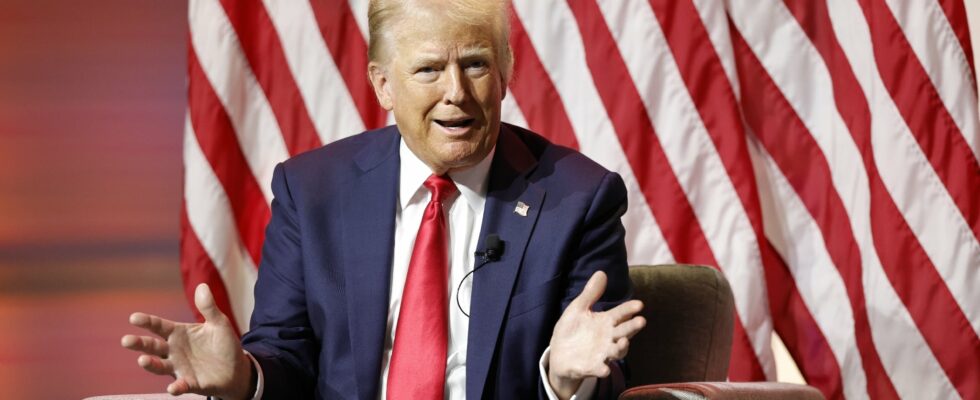No Olympic truce on the financial markets. Status quo of the Fed in the United States, increase in key rates in Japan, disappointing activity and employment indicators across the Atlantic, fear of recession… and a little nervousness among operators. A cocktail that has caused the world’s stock markets to plunge, from Tokyo (-12% on Monday before a 10% rebound the next day) to New York (-3.4% on the Nasdaq on August 5). For Ludovic Subran, chief economist of the Allianz group, this wave of panic is excessive. The American economy remains solid. Nevertheless, depending on the outcome of the presidential election, the risk of recession will be amplified, or not.
L’Express: The wave of panic on the markets started in Japan. Why?
Ludovic Subran: Mainly because of what is called the “carry trade”. Some investors borrowed at very low rates in Japan to buy higher-yielding assets in the United States and Europe. Interest rate and exchange rate differentials allowed them to make capital gains, even on low-risk assets like US Treasuries. There was easy money to be made, but the tide has turned. The Bank of Japan started raising rates last week. Its economy is doing better, with some inflation. It should therefore continue to tighten its monetary policy. This anticipation has pushed traders to unwind their positions and sell Japanese assets. But this is not the only reason for the turmoil observed on the markets, far from it.
What explains investors’ nervousness, to the point that the volatility index (Vix) returned to its 2020 levels on Monday, in the midst of the health crisis?
The July US employment figures, published on Friday, were not good, and many investors were worried about a slowdown in the US economy. In particular, a leading indicator of recession, the “Sahm rule”, based on employment data, was activated. But there were already reasons for a market correction, given the size of stock index valuations.
Especially since this fear of recession comes during an election campaign, with great uncertainty about the outcome of the vote, and while a cycle of monetary easing is beginning. A context that makes the markets more feverish. At Allianz, we do not see a bubble, even on the “Magnificent Seven” [NDLR : ces sept entreprises tech qui dominent Wall Street : Alphabet, Amazon, Meta, Apple, Microsoft, Nvidia et Tesla]. Geopolitical risk is still there, but it has not increased. The rise in the Vix therefore seems excessive to us. We see the moment rather as an opportunity to invest, particularly in bonds.
Are you one of those who think that the Fed should have lowered its rates last week, to prevent this risk of recession?
Everyone thinks they’re a central banker, but it’s always easy to judge in hindsight. The economy is not bad, and the Fed will have plenty of time to cut rates when the time comes. If it had done so last week, it would have been accused of supporting the Democratic camp. It is managing the economy’s soft landing very well.
So you are putting the stock market turmoil of the last few days into perspective…
The good news is that the Fed has not judged the situation to be serious enough to require its emergency intervention. There will surely be further shocks and it is advisable to remain cautious on real estate, risky assets, pension funds… It is in this kind of period that we realize that some had taken a lot of risks. Nevertheless, I do not see a systemic chain reaction.
The US economy has not gone into recession despite a 500 basis point increase in rates, thanks to its fiscal policy, immigration and technological productivity gains. The US has great companies that are going to make the technology of tomorrow, it has the energy. The real issues are fiscal policy and immigration, because Trump has promised tax cuts and plans to deport 7.7 million people. His policies are shaping up to be inflationary.
So the risk is greater if the Republican candidate wins?
If elected, Kamala Harris will be less aggressive in terms of tax cuts, but at the same time, the Fed would lower its rates. We could see a mild recession, as early as 2025. If Donald Trump comes to power, he will pursue a policy of supporting businesses, but the Fed will not be able to ease. A short-term positive effect on the economy in 2025 would be followed by a severe recession in 2026, fueled by very high debt and high rates.
What does the American voter think?
Americans are worried about their purchasing power. There is a very partisan perception that life is very expensive, which is why Kamala Harris’s task is difficult. Inflation is the lifeblood of populism. There is no fear of recession and rising unemployment yet. If the employment figures turn out to be very negative in September-October, that could be a boost for Donald Trump.
Europe has not escaped this general downward movement on the financial markets, including the CAC 40, which was still down on Tuesday. Since the beginning of the year, the performance of the Paris index appears to be lagging, particularly the German Dax or the British Footsie. How do you explain this?
France is still paying for the absence of a Prime Minister. There has been a risk premium since the dissolution, which has not dissipated. Investors do not like to see politicians who declare that they want to get out of European rules, whether it is Jordan Bardella or Lucie Castets. They wonder about the ability of the French economy to rebound in the absence of activist public policies. They hear talk of a minimum wage of 1,600 euros, of a challenge to the pension reform… This political instability means that France is less reassuring than England, Germany or Spain.
.
